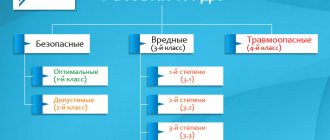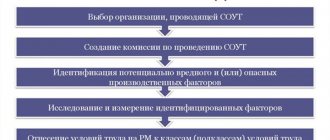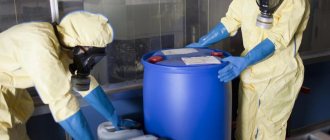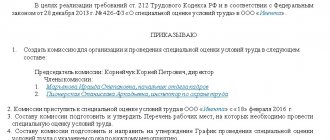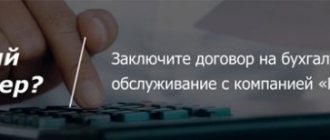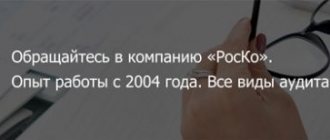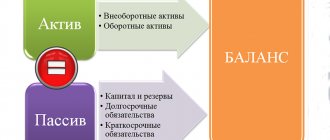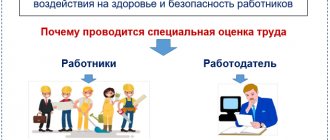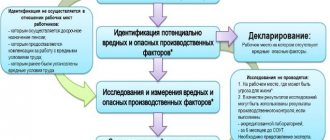The procedure for special assessment of working conditions (SOUT) according to the current rules has been carried out since 2014. There are no changes to the rules this year compared to previous periods, but by 01/01/19 all firms are required to conduct a workplace assessment according to the new rules.
The legislator did not provide for the specifics of this procedure for representatives of small businesses. SOUT is carried out by special accredited organizations for a fee. There are situations in which a company does not need to carry out SOUT and pay for it. A small enterprise has more opportunities to do this than representatives of medium and large businesses.
Question: How to draw up an additional agreement to an employment contract based on the results of a special assessment of working conditions (SOUT)? View answer
What is SOUT?
SOUT is a comprehensive analysis of all negative production factors and their impact on personnel, in order to determine the compliance of working conditions with current legislation and regulations.
Employees whose working conditions are found to be hazardous to health should receive monetary compensation, regular medical examinations and the possibility of early retirement. Experts note that according to the new rules, not only have the criteria for assessing the safety of places of work changed, but also the penalties for failure to comply with the requirements have been significantly tightened.
Conducting a special assessment of working conditions
CONTENTS
• The essence of a special assessment of working conditions • When is an unscheduled SOUT required?• Who needs to conduct • Who conducts the special assessment?
• What is subject to special assessment? • Results of a special assessment of working conditions
• Timing of the planned SOUT • Responsibility for violations (fines)
Since the beginning of 2014, Federal Law No. 426-FZ dated December 28, 2013 (hereinafter referred to as the Law on SOUT) has been in force. Its provisions completely abolished the certification of workplaces, and instead introduced a new procedure for analyzing harmful factors at work - a special assessment of working conditions (hereinafter referred to as SOUT).
Despite the fact that the transition period is still ongoing, and for many the deadline for carrying out the SOUT will be December 2021, labor inspectors are already conducting regular and unscheduled inspections, identifying thousands of violations. To avoid incurring fines and penalties, employers should understand the innovations as early as possible.
The essence of a special assessment of working conditions
SOUT, in essence, is a check and assessment by independent experts of working conditions at predetermined workplaces. If work is associated with harmful and dangerous influences, a specialized organization makes the necessary instrumental measurements and, having established the influence of conditions on people working there, assigns the workplace one of the possible classes:
- Optimal; acceptable;
- Harmful; dangerous.
The amount paid by the employer for its employees to the Pension Fund of the Russian Federation, as well as the amount of benefits entitled to employees (additional leave, shortened working hours, etc.) depends on the results of the SOUT.
Reducing the impact of detected harmful factors in the future can minimize the established additional tariff and even reduce it to zero, and will also reduce the employer’s costs for compensation and guarantees for employees engaged in hazardous production. It turns out that the better the working conditions of employees, the less the employer will have to pay.
Who needs to conduct SOUT?
The Law on SOUT places the responsibility for financing and organizing the special assessment process on all employers - legal entities and individual entrepreneurs who employ employees. Accordingly, a special assessment of working conditions is not required:
1) Entrepreneurs operating without hiring employees;
2) Employers - individuals.
What is subject to special assessment?
The working conditions of employees are assessed based on the physical parameters of their workplaces, i.e. places under the control of the employer, to which employees need to arrive to perform their job duties. According to the Law on Specialized Labor and Employment, the positions of all employees must be assessed, except those who:
- works for employers - individuals;
- works from home;
- performs work remotely.
Working conditions are checked at all workplaces, taking into account their similarity. Jobs that are considered similar are:
- are located in similar areas with the same lighting, ventilation and heating conditions;
- equipped with the same production equipment and personal protective equipment;
- involve the work of employees with the same positions and job functions.
Despite the fact that only a fifth of similar workplaces are subject to inspection (but not less than two), the results of a special assessment of working conditions apply to all similar workplaces.
Timing of the planned SOUT
From 2014 to 2021, legislators have provided for a transition period, during which the results of previously conducted certification of workplaces will be valid and a phased implementation of a set of assessment measures will be possible. However, there are workplaces where SAS needs to be carried out immediately. The Law on SOUT lists the deadlines given to employers to obtain the primary results of a planned special assessment for various groups of jobs:
1) At workplaces certified before the entry into force of the Law on SOUT , a special assessment is carried out until the end of the validity of the certification results, i.e. within five years from the date of its implementation.
Important! At the employer’s initiative, it is possible to conduct a planned special assessment ahead of schedule. This may be required in cases where working conditions at workplaces have been improved since the certification, and based on the results of the assessment and assessment, the employer plans to reduce its costs of providing guarantees and compensation to preferential categories of employees.
2) At workplaces that are active and not previously subject to certification:
a) A special assessment is carried out until December 31, 2021, if the type of these jobs is not listed in clauses 1, 2, part 6 of art. 10 of the Law on SOUT. This list includes jobs of employees whose duties are related exclusively to:
- working on computers;
- periodic use of printers, copiers, and household appliances.
However, the process of organizing SOUT should be carried out in stages and not be postponed until the end of 2021. After all, the rush demand for the services of experts and the workload of specialized organizations - appraisers at the end of the transition period can create conditions in which obtaining the results of the assessment system within the specified time frame will become impossible.
b) A special assessment is carried out immediately if the type of these jobs is included in clauses 1, 2, part 6 of art. 10 of the Law on SOUT. Such workplaces include those where work provides employees with:
- early retirement in old age;
- guarantees and compensation in connection with dangerous and harmful working conditions.
When the five-year period of validity of the results of the primary SOUT ends, there is a need to conduct a re-assessment, but only for those employers who had previously identified dangerous or harmful working conditions. For employers who have a declaration of workplace compliance with established standards (of course, if working conditions have not changed and remain safe), the effect of the results recorded by the primary SOUT is extended for the next five years, reducing the employer’s expenses for carrying out special assessment activities.
If no circumstances arise that cancel the validity of the declaration, it, according to experts, will continue to work, because the Law on SOUT does not provide for the number of possible extensions. However, judicial practice has not yet been formed on this issue and it is quite possible that different opinions may soon arise.
In what cases is an unscheduled SOUT required?
The transition period does not apply to unscheduled special assessments, which means that now all employers who experience the events listed in Art. 17 of the Law on SOUT, within six months they are required to carry out unscheduled measures to assess working conditions. Conditions that cause unscheduled emergency conditions include:
- the creation of new jobs, including only for registered employers;
- changes in the production process, composition of materials used and other factors that may affect the harmfulness and danger of work for workers;
- an employee’s occupational disease or industrial accident, the occurrence of which is associated with dangerous working conditions;
- union demand;
- instructions from the labor inspectorate.
Who conducts a special assessment of working conditions?
To identify potentially dangerous factors, measure deviations from the norm, as well as to document the results of the special assessment system, the employer must engage a specialized organization on the basis of a civil law contract. In addition, it is possible to simultaneously conclude a voluntary liability insurance agreement in order to minimize the risk of damage during the process of measurements, research and other aspects of the experts’ work.
Taking into account the requirements of the Law on Special Assessment of Expertise regarding the independence of experts, restrictions are imposed on the list of persons allowed to conduct a special assessment. For example, the founder of the organization being inspected or his close relative cannot conduct an audit.
Specialized organizations must also comply with the conditions prescribed in the Law on SOUT, compliance with which is confirmed by certification of the Ministry of Labor of the Russian Federation and inclusion in a special register open for review on the website www.rosmintrud.ru . In particular, until December 2018, this register will include companies that were previously admitted to certification of workplaces and have an accreditation certificate valid as of the current date.
Before concluding an agreement on carrying out SOUT with any company, the employer must check its compliance with all legal requirements. Otherwise, the results of the special assessment of working conditions may be canceled by the labor inspectorate, and the employer will have to bear the costs of conducting a repeat, unscheduled assessment.
Results of a special assessment of working conditions
The results of the SOUT are compiled in the form of a report from an expert organization in a form approved by the Ministry of Labor. The document reflects a list of specific workplaces and the classes and subclasses of working conditions established for them. The results of the SOUT become effective from the date the report is signed and oblige the employer to:
- transfer additional contributions to the Pension Fund (for classes “harmful” - from 2 to 7% and “dangerous” - 8%);
- provide the necessary guarantees and compensation to employees;
- provide workers with the necessary protective equipment;
- carry out activities that influence the minimization and elimination of the harmfulness and danger of production factors;
- exercise control over maintaining the safety of workplaces included in the “optimal” and “permissible” classes.
Within the next 30 calendar days, all employees whose workplaces were inspected during the special assessment must be familiarized with the report. If an employee does not agree with the results, he has the right to request a state examination of his workplace. If the results of the assessment system do not satisfy the employing organization, it can submit an application to the Ministry of Labor and Social Protection, appeal the unfounded or inaccurate results of the inspection and conduct a second special assessment.
In addition, within the next month, the results of the SOUT must be posted by the employing organization on the official website (if available). The territorial body of the FSS is notified within the deadlines provided for the submission of current reports, and the information is submitted by inclusion in section 10 of form 4-FSS.
Responsibility for violations in the field of SOUT
During the first year of operation of the Law on Special Labor Laws, more than 23 thousand were recorded, and in the first half of 2015 - over 11 thousand cases of non-compliance with labor legislation. According to the Federal Labor and Employment Service, which analyzed the violations identified, the most common employer misconduct is:
1) Failure to carry out special assessment procedures in cases where it is necessary;
2) Failure to communicate the results of the special operational assessment to employees;
3) Violation of the procedure for conducting SOUT in terms of:
- non-involvement of a specialized organization;
- absence of a commission or non-involvement of workers in its composition;
- analysis of not all eligible jobs;
4) Lack of proper documentation of the results of a special assessment of working conditions;
5) Failure to provide adequate guarantees and compensation based on the assigned classes of working conditions.
Both the organization itself that committed the offense and its officials (manager, occupational safety specialist or other person who, by virtue of the position or order of the director, is entrusted with the responsibility for carrying out the special labor safety system) can be held accountable for violations in the field of SAW. Moreover, the application of punishment to a legal entity can be carried out simultaneously with the holding of responsible employees to administrative responsibility, which comes from the analysis of Part 3 of Art. 2.1 Code of Administrative Offenses of the Russian Federation.
Administrative punishment for failure to carry out or violation of the procedure for organizing SOUT is determined in accordance with Art. 5.27.1 of the Code of Administrative Offenses of the Russian Federation, and its shape and size depend on a number of factors:
- in relation to whom it is applied (legal entity, individual entrepreneur or official);
- primary or repeated prosecution;
- absence of a threat to life and health (warning or fine) or harm to employees (suspension of activities and disqualification of persons) due to the employer’s misconduct.
In particular, the fines are provided for:
- For organizations – 60-80 thousand rubles. for primary and 100-200 thousand rubles. in case of repeated offense;
- For individual entrepreneurs and officials – 5-10 thousand rubles. for primary and 30-40 thousand rubles. upon repeated offence.
When a violation entails a threat to human health or an accident, punishment can be applied in the form of suspension of the activities of a legal entity or individual entrepreneur for 90 days, and officials held accountable are disqualified for a period of one to three years.
Conclusion
The state tries to protect its citizens and provide them with certain rights, including the right to safe work. According to statistics, about 40% of existing jobs are associated with risk factors for health and life. By introducing a mandatory assessment of the harmfulness and danger of working conditions, legislators minimize the likelihood of injuries or illnesses received at work.
I am glad that when carrying out state regulation in the field of labor protection, not only “sticks” were provided in the form of fines and penalties for failure to comply with the requirements of the Law on Labor Safety, but also “carrots” that provide a bona fide employer with a minimum of additional costs and the constant extension of the declaration of conformity. In addition, for an employer who has organized the SOUTH system in a timely and high-quality manner, even reports to the state information system can be sent by a specialized company that carried out the assessment.
By whom and when is SOUT carried out?
All material costs for conducting SOUT fall on the shoulders of the employer. A special commission is engaged in analyzing the state of working conditions, which includes:
- responsible for labor safety issues at the enterprise;
- an employee competent in matters of the enterprise’s activities, including production technology;
- trade union representative;
- a representative of an organization that has the right to conduct an examination (its presence is mandatory, and the expert organization must be accredited).
According to the law, employers who currently have certification according to the old model are required to conduct an assessment system in compliance with the new requirements by December 31, 2021. However, this does not apply to enterprises with hazardous working conditions; they must conduct an assessment immediately. Enterprises that have already carried out SOUT undergo the next inspection either scheduled, once every five years, or unscheduled. The prerequisites for an unscheduled inspection are:
- opening of new jobs;
- relocation of the enterprise to another address;
- change in production technology;
- industrial injuries, or deterioration in the health of employees in connection with their professional activities.
Six months are allotted to complete an unscheduled inspection.
What to do with the results of the special assessment
The commission (or the individual entrepreneur himself) signs the report on the special assessment. After that:
- Within 30 days from the date the report was signed, familiarize employees with the results of the special assessment against signature.
- Within the same period, publish the results of the special assessment on your website, if you have one. For example, Kontur on its website formatted it like this:
- You also have 30 days to send a declaration to the labor inspectorate regarding workplaces where no harmful conditions were found. The declaration will confirm that you have met all workplace requirements.
- Fill out the results of the special assessment in Table 5 of the 4-FSS report.
Table 5 is filled out according to data as of January 1 of the reporting year. If you conducted a special assessment in 2021, its results will only appear in the report next year. In the 4-FSS report for 2021, indicate the results of the previous special assessment, if any.
And in all 4-FSS reports in 2021, Table 5 will be the same with the results of the 2021 special assessment.
Procedure for carrying out SOUT
To carry out an assessment in accordance with all standards, a certain procedure must be followed. After concluding an agreement with an independent expert company, the composition of the commission and the schedule of activities are approved. The employer is obliged to provide all required documentation related to the organization of work and provide access to all premises. During the certification, a list of places of work to be assessed for safety, as well as existing positive and negative factors, is compiled. The result of the work done is a comprehensive final document containing all the necessary information:
- Documentation related to the organization of work provided by the employer.
- List of jobs to be assessed.
- Information about the expert company.
- Assessment of individual jobs.
- Summary documents for all workplaces.
- The result of the meeting of the certification commission.
- Action plan to improve working conditions.
- Conclusion.
Choosing a specialized organization
Organizations that meet the requirements of Art. have the right to conduct SOUT. 19 of Law No. 426-FZ. In particular, they must have a testing laboratory and at least five certified experts on staff. Which organizations are eligible to conduct a special assessment? You can find out this from a special register, which is located on the Internet at https://akot.rosmintrud.ru/ot/organizations/
The employer, having chosen an organization to conduct special labor training, enters into a civil contract with it. As part of the contract, the customer is obliged to provide the contractor with all the necessary documents and other information to assess working conditions and harmful (hazardous) production factors.
Who may not pass the certification?
SOUT is carried out by all organizations without exception, including individual entrepreneurs. Previously, only workplaces where potential sources of danger were used, that is, various mechanisms, special equipment, vehicles, etc., were certified. Now all jobs are subject to assessment, including office employees, except for those who work from home via remote access and those whose employers are individuals who have not been registered as individual entrepreneurs.
Who needs a special assessment
A special assessment is carried out by all LLCs and entrepreneurs with employees: even stores with one cashier or web studios with only one designer. A special assessment is needed even when the staff has drivers or employees who work on site.
Only entrepreneurs without employees or with remote employees do not need a special assessment.
Submit reports without accounting knowledge
Elba will prepare all the necessary reports: 27 per year for individual entrepreneurs, 29 per year for LLCs. Forms will be filled out automatically, salary payments and taxes will also be generated.
Try 30 days free Gift for new entrepreneurs A year on “Premium” for individual entrepreneurs under 3 months
The cost of carrying out SOUT and factors influencing it
The price that needs to be paid for carrying out SOUT depends on the number of jobs, as well as on the nature of the enterprise’s activities. The cost of assessment for places where work is classified as safe without additional research is significantly lower than the price of a similar service for places where work is associated with hazardous factors that need to be comprehensively studied and analyzed. Depending on the number of factors that need to be taken into account, the price can range from 700 to 1,200 rubles. for one workplace. It should also be taken into account that there is no need to evaluate all similar places. Places located in the same room, adapted to perform the same functions, are considered similar. The total number of places subject to assessment cannot be less than two (except for enterprises with one workplace) and be less than 20 percent of the total number.
Saving can be costly
The Labor Code of the Russian Federation (Article 212) directly obliges the employer to conduct a special assessment of the working conditions of employees.
The legislator and regulatory authorities consider refusal to carry out special operational assessments as a violation of personnel rights. The fines for this violation are quite high. If we take into account the size and number of jobs in small enterprises, it becomes clear that it is not profitable for a manager to break the law.
Amount of penalties (according to the text of Article 5.27.1 of the Code of Administrative Offences):
- for the management of the company - from 5 to 10 thousand rubles;
- per company - from 60 to 80 thousand rubles;
- per entrepreneur - from 5 to 10 thousand rubles.
It is worth noting that in case of repeated violation, the fine for the organization can reach 200 thousand rubles, and for the manager (and individual entrepreneur) - up to 40 thousand rubles. A fine may be issued to the manager and the legal entity he manages at the same time. The fine can be replaced by suspension of the company's work for up to 90 days.
Producers get milk, and office workers...
The work of an office worker, assessed from the point of view of physical activity, cannot be called difficult, but from a psychological point of view, it is one of the most committed groups to depression and neuroses. Despite this, the only thing an office employee can now count on based on the results of SOUT is the provision of an individual work schedule and periodic medical examinations, which is influenced by the time spent at the PC. For example, if an employee spends 50 percent or more of the time at the computer, then he is subject to mandatory medical examinations. And based on SanPiN 2.2.2/2.4.1340-03, the work regime for him will include 15-minute breaks 2 hours after the start of work and 3 hours after the lunch break. If the work includes the mode of entering information and its subsequent adjustment (belongs to the average category of complexity), it is customary to provide 10-minute breaks after 1.5 hours.
The employer is obliged to accept all recommendations of the expert on occupational safety and health assessment and introduce them into the work process from the moment the results of the occupational safety and health assessment are received in order to prevent the development of occupational diseases in the employee.
If, after the assessment, an office employee’s health deterioration is noticed, it will be necessary to carry out production monitoring, which involves a wider list of measured factors and to note which indicator negatively affects the employee.
What jobs need to be assessed?
A special assessment of working conditions does not need to be carried out only in relation to homeworkers and remote workers; all other workplaces should be assessed for their safety and compliance with labor protection standards. Compared to workplace certification, which was in force until January 1, 2014, special assessment is a more global and large-scale phenomenon and affects all employers, regardless of their legal form and number of employees.
It is also necessary to evaluate the working conditions of workers who have a traveling nature of work (drivers, couriers, sales representatives, agents, etc.) or do not have a fixed workplace (security guards). You will have to make sure that working conditions are safe even for the director whose workplace is located at his home address, if the LLC is registered at this address. But an individual entrepreneur should not conduct a special assessment of himself.
Please note: if your employees provide services within the framework of a civil contract[/anchor], then a special assessment of the working conditions of their workplaces is not carried out, because in fact, they are not workers, but only performers. Labor laws do not apply to them.
The cost of assessing one workplace by a specialized organization starts from 1,500 rubles, therefore, the more workplaces are created, the more expensive it will cost the employer. True, there is an opportunity to save on the services of appraisers if several jobs are found to be similar.
It means that:
- workplaces are located in the same type of production premises;
- the premises are equipped with the same ventilation, air conditioning, heating, and lighting systems;
- employees work in the same profession, position, specialty;
- labor functions, working hours, technological process are of the same type;
- the same equipment, tools, raw materials and materials are used in the work;
- workers are provided with the same personal protective equipment.
For such jobs, it is enough to evaluate only 20% of their number, but not less than two.
Responsibility for non-compliance with SOUT
A special assessment of working conditions determines the requirements that the employer needs to provide for its employees in their places.
These may include periodic medical examinations, issuance of personal protective equipment and protective clothing, provision of special meals, approval of shortened working hours, payment of compensation for hazardous working conditions, provision of additional leave and transfer of additional contributions, and much more.
If a special assessment was carried out at the enterprise, which revealed harmful or dangerous conditions in the workplace, and the administration did not take any of the mandatory measures to reduce harm to the health of workers, then liability may be applied to the responsible persons.
Minimum - administrative in the form of fines, and if harm was caused to employees - up to criminal and prohibition of the right to engage in a certain type of activity.
a common problem
Current regulations, namely the provisions of the Labor Code of the Russian Federation and Law No. 426-FZ, determine that each employer is required to conduct a special assessment of working conditions before December 31, 2018.
Moreover, this procedure is carried out at the expense of the employer. Before the expiration of the specified period, organizations have the right to use in their work the results of certification of workplaces that were used previously. Such provisions are provided for in the Letter of the Ministry of Labor dated 01.06.2018 No. 15-4/10/B-4010.
Representatives of the Ministry of Labor noted that until April 2021, only 65% of all jobs were assessed. There is an opinion that other employers will not have time to complete the mandatory procedure by the appointed date. In connection with the current circumstances, the Ministry of Labor officially stated:
The deadlines will not be rescheduled! The mandatory SOUT must be completed by 12/31/2018. Otherwise, violators will be held accountable.
